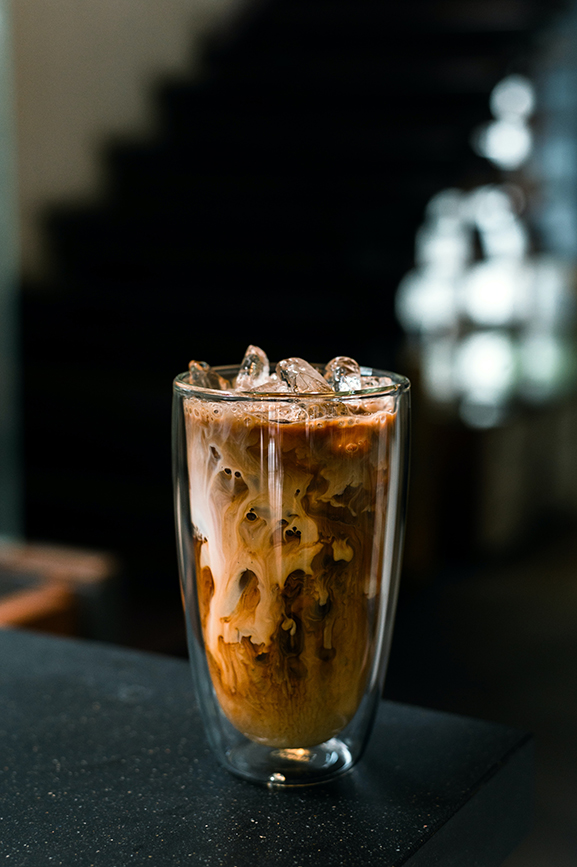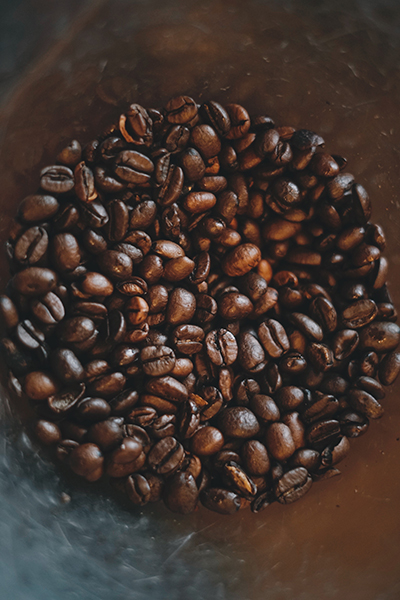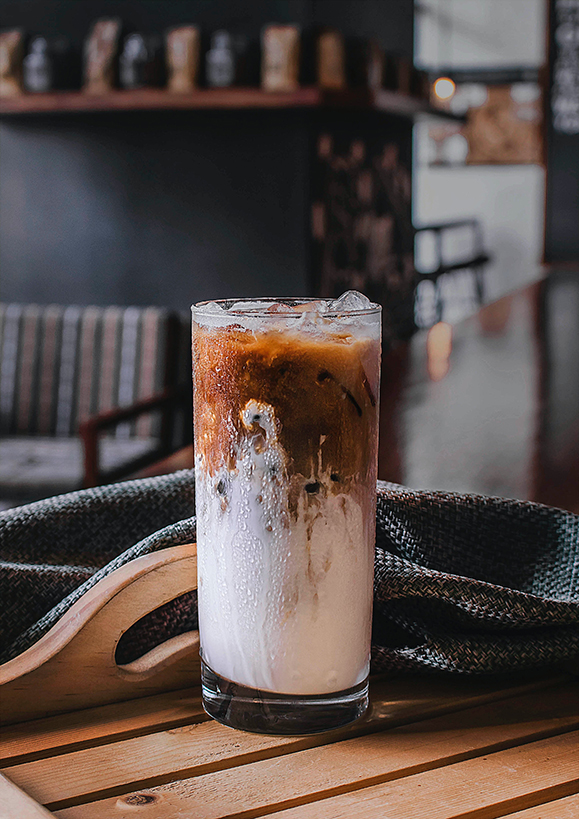Cold brew coffee, a unique variant of our beloved caffeine fix, has recently gained immense popularity. Unlike traditional coffee brewing methods, cold brew coffee involves the steeping of coffee grounds in cold water for extended periods. This coffee brewing technique results in a coffee concentrate that you can mix with cold water or milk, creating a refreshing and less acidic beverage.

The key difference between cold brew and regular coffee lies in brewing. Traditional coffee is brewed quickly using hot water, which extracts the flavor, aroma, and acidity from the coffee beans. However, cold brew coffee is steeped for 12-24 hours in cold water, resulting in a smoother, naturally sweeter, and less acidic beverage. This unique brewing process contributes to higher caffeine content, making cold brew a favorite among coffee enthusiasts.
The Process of Cold Brewing
So, what exactly is cold brewing? Cold brewing is a coffee-making method that involves steeping coffee grounds in cold or room-temperature water for an extended period. This slow extraction process allows the coffee flavors to infuse the water, creating a strong coffee concentrate. The concentrate is then diluted with water or milk and served cold.
The history and origin of cold brew coffee are ambiguous. However, it’s believed to have originated in Kyoto, Japan, where it was popular as a ceremonial drink and often consumed in the hot summer months. Over time, the method spread to Europe and America, becoming popular in many coffee shops and households.
Step-by-step Guide To Making Cold Brew Coffee At Home
Making good cold brew coffee at home is a straightforward process. Here’s a step-by-step guide:
- Coarsely grind your coffee beans.
- Combine the coffee grounds as well as cold water in a jar or a cold brew coffee maker.
- Stir the mixture very well to ensure all the coffee grounds are saturated.
- Cover and let it steep for 12-24 hours at room temperature.
- Strain the coffee concentrate using a fine-mesh sieve or a coffee filter.
- Dilute the concentrate with either water or milk and serve over ice.
The necessary equipment for cold brewing includes a large jar or a cold brew coffee maker, a coffee grinder, a fine-mesh sieve or coffee filter, and a long spoon or a stirrer. A refrigerator is also necessary for storing the coffee concentrate.
The result is an incredibly smooth coffee concentrate that can be stored in an airtight container for up to two weeks when refrigerated — perfect for making chilled drinks all summer!
Necessary Equipment For Cold Brewing
To successfully craft cold brew coffee at home, specific equipment is necessary. The primary pieces of equipment required for cold brewing are:
Grinder
A burr grinder is ideal for achieving an even grind size; it can also be adjusted for finer grounds necessary in the slow-steeping process of cold brewing.
Filter
Cold brew requires a fine mesh filter to strain out coffee particles upon pouring; this can be achieved with either a sieve or cheesecloth.
Large pitcher or container
To ensure all flavors are extracted from the beans during the 12-24 hour steep period, a large enough pitcher or container should be used to give ample room to agitate and mix the grounds during the process.,
Stirring utensil
A long spoon or stirrer should be utilized to reach down into the bottom of whatever vessel is being used to properly blend all ingredients and create an even extraction of flavor compounds from the grounds.
If kept clean and dry between uses, these pieces of equipment will last many years and provide steady results every time they’re employed.
Best Types Of Coffee Beans For Cold Brewing
The best types of bean for cold brewing are typically medium to dark roasts. These roasts produce a smoother and more flavorful cold brew. However, the choice of coffee beans largely depends on personal preference.

Comparing various types of coffee beans for cold brewing can yield different flavor profiles and strengths in the end product. Some factors to consider when choosing a bean are its roast, origin, grind size, and freshness.
- Roast: Lighter roasts have more complexity, while darker roasts tend to be bolder.
- Origin: African beans generally have a fruity component, whereas Central American coffees may be nuttier or chocolatey.
- Grind Size: A finer grind will extract more quickly, while a coarser grind will produce something smoother.
- Freshness: The fresher the coffee beans, the more aromatic and flavorful they are likely to be when brewed cold.
Perfecting The Cold Brew Process
In addition to bean selection and grind size, various methods can be used for cold brewing coffee. These include:
- Classic immersion (in which ground coffee is steeped in water)
- Slow drip (using gravity through a paper filter)
- Pressure extraction (similar to espresso).
Each method yields different results depending on your available time and what kind of flavor profile you aim for. Experimenting with other processes can help you identify your preferred technique for making cold brew coffee that suits your taste buds perfectly!
The Benefits of Cold Brew Coffee
There are several main benefits of cold brew coffee that we will now look at.
Lower Acidity
A key benefit of cold brew coffee is its lower acidity compared to hot brewed coffee. The cold brewing process significantly reduces the amount of acid extracted from the coffee beans, making it an excellent option for people with sensitive stomachs or acid reflux. The National Coffee Association says cold brew coffee is 67% less acidic than hot-brewed coffee.
A Smoother Flavor
Another advantage of cold brew coffee is its smoother, less bitter flavor. The slow extraction process allows for a full-bodied, rich flavor profile that lacks the bitterness often associated with hot brewed coffee. This unique flavor profile makes cold brew coffee a versatile ingredient in various coffee recipes.
A Higher Caffeine Content
Cold brew coffee also boasts a higher caffeine content. The prolonged steeping process extracts more caffeine from the coffee grounds, resulting in a stronger, more potent brew. It makes cold brew a perfect pick-me-up for those needing an extra caffeine kick.
Longer Shelf Life
A cold brew coffee has a lengthy shelf life. Unlike hot coffee, which tends to go stale within a few hours, cold brew coffee can be kept in the refrigerator for up to two weeks without losing flavor. It makes it convenient for those who prefer to prepare their coffee in advance.
| Shelf Life | Cold Brew | Hot Brew |
|---|---|---|
| Hours stored at room temperature | 72 hours (3 days) | 12 hours (1 day) |
| Days Refrigerated | 14 | 4 days |
Versatility In Coffee Recipes
The longer shelf life of cold brew coffee makes it an ideal ingredient for coffee recipes. It is because the process used to make cold brew coffee results in a less acidic, smoother, and more concentrated product than regular brewed hot coffee. Therefore, this type of coffee can be used as an alternative when preparing various drinks or dishes that call for coffee as an ingredient.

For example, cold brew can be used to make ice cream, cheesecake, cocktails, and even smoothies. Additionally, due to its mellow flavor profile and low acidity levels, it can be added to dessert sauces and marinades for meats and vegetables.
Health Benefits
Studies have shown that consuming cold brew coffee can lead to various health benefits, including increased levels of antioxidants, reduced risk of heart disease, and improved cognitive functioning. Antioxidants are molecules that help protect cells from damage caused by free radicals. Consuming cold brew coffee can provide ample antioxidants, which can prevent cellular damage and support overall health.
According to Healthline, research has also indicated that drinking cold brew coffee may benefit cardiovascular health by reducing the risk of developing coronary artery disease. The polyphenols found in cold brew coffee may reduce inflammation and oxidative stress, both associated with cardiovascular diseases such as stroke and heart attack.
Cold brew coffee may also boost cognitive performance due to its caffeine content, which is known to improve alertness, focus, and reaction time.
Encouragement For Those Making Their Own Cold Brew Coffee
The benefits of making your own cold brew are diverse and plentiful. It makes for a delicious cup of coffee and saves money compared to purchasing pre-made drinks at the store or cafe.
Furthermore, it allows for creative experimentation with different types of beans, grinds, steeping times, dilution ratios, and more so you can find the perfect blend that suits best. With these advantages in mind, you should try this fun coffee brewing method!
| Benefits | Drawbacks | Emotion |
|---|---|---|
| Delicious cup of coffee | Requires patience | Excitement |
| Saves money compared to purchasing pre-made | Beans must be ground correctly | Satisfaction |
| Allows for creative experimentation | Steeping times must be monitored | Anticipation |
Conclusion
In conclusion, cold brew coffee offers a unique brewing method that produces a smooth, less acidic beverage with higher caffeine content. Its versatility in coffee recipes and potential health benefits make it an excellent choice for coffee enthusiasts.
Whether you’re a seasoned coffee connoisseur or a casual drinker, we encourage you to try making your cold brew coffee home. It might just become your new favorite way to enjoy coffee.
FAQs
Does cold brew coffee have the same benefits as regular coffee?
While cold brew and regular coffee share some benefits, such as being rich in antioxidants and potentially reducing the risk of heart disease, cold brew coffee has some unique advantages, these include lower acidity, smoother flavor, and higher caffeine content.
What should I ask for in cold brew?
You can ask for it black or with milk when ordering cold brew coffee. You can also request a specific coffee-to-water ratio for a stronger or milder brew. Some coffee shops also offer flavored cold brew options like vanilla or caramel.
Why do people love cold brew?
People love cold brew coffee for its unique flavor profile, which is smooth and less bitter than hot brewed coffee. The higher caffeine content and lower acidity also appeal to many coffee drinkers. Additionally, the versatility and convenience of cold brew coffee make it a popular choice.

Written by Carla – Coffee Writer and Researcher at MyCoffeeBeanz.com
Carla has a long association with coffee and one of her fondest childhood memories is the wonderful aroma of coffee beans ground daily by her Italian father to start his working day. As a full time writer and researcher in the coffee industry, Carla is committed to providing well researched and written coffee-related content for our readers. More about Carla
